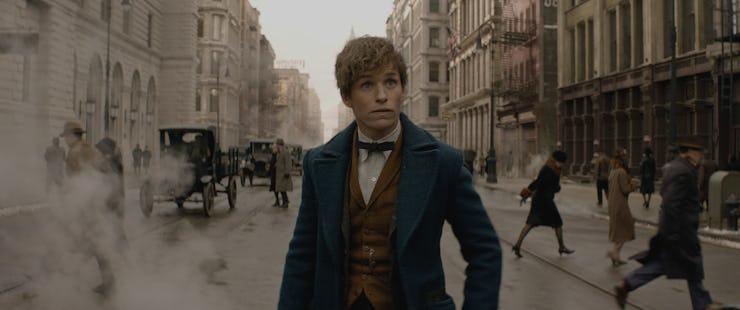No, JK Rowling Continuing Harry Potter Isn't (Entirely) Cynical
Expanding canon is how we live now, and it has the power to be great.

Last weekend, Harry Potter and the Cursed Child hit bookstores and turned our attention once more to the Potterverse. Then again, while the play has certainly put Harry Potter back in front page headlines, we’re never really that far away from the Wizarding World, thanks to near-constant Pottermore updates, the upcoming release of Fantastic Beasts and Where to Find Them, and the promise of a Fantastic Beasts sequel.
The Potter Universe is constantly expanding, and in setting it free with plays, installments on Pottermore, films, and short companion stories like Tales of Beedle the Bard and Quidditch Through the Ages, J.K. Rowling’s become something of a modern-day Agatha Christie — another author who plucked characters from the pages of her books and told their stories in new ways and with different mediums.
There has been plenty of criticism of her decision to expand the canon, but perhaps there’s something to be said for never really having to leave something you love behind. Maybe there’s value in keeping Potter as fresh and immediate for today’s kids as it was for me in 1998 by constantly updating it. In a world that’s obsessed with what’s happening now, I’m not sure it’s a bad thing that Harry Potter and the Wizarding World still feel like things that are happening now. It also feels like quite a good thing that a world as rich and full of possibilities as the Wizarding World has been set free and given permission to thrive outside of Harry Potter’s corner of it.
There were a lot of adults at massive celebrations in bookstores last weekend, eagerly awaiting the release of Harry Potter and the Cursed Child, but there were also a lot of kids. Kids who were dressed up and willing to wait for hours, much like kids did when the later installments of the original Harry Potter series hit shelve. Though those of us who are in our 20s or 30s now may feel like Harry belongs to us, and that the fact that we grew up with him — literally — gives us some kind of ownership over the way the stories exist, unfold or change, it’s important to recognize that the constant updating of the canon gives kids an “in.”
While I doubt that most kids’ first Harry Potter reading experience is going to be Cursed Child, the fact that Harry Potter feels immediate and relevant through the Cursed Child release, through Pottermore and through Fantastic Beasts only means that kids are going to find more reasons to pull a 20 year-old book off the shelf.
It’s not just for the kids, though. On a selfish level, I like the idea that Harry Potter is still happening. I like that it doesn’t feel like something I’ve had to leave behind, like something that belongs in the past. I like that it isnt some static thing, stuck in amber — preserved, untouchable and unchanging. Harry Potter and the Wizarding World don’t just exist in books anymore. The world is pushing itself outward, into digital media, into plays, into more films, and that has the power to be a beautiful thing, full of opportunity.
Admittedly, these new installments are imperfect. Some of the new Pottermore content is deeply appropriative and controversial. There are hefty criticisms of Cursed Child. We have no idea whether or not Fantastic Beasts is going to be as great as we hope and expect it to be.
But the quality of individual portions of additional content are largely external to the central argument that this expanding canon cheapens and dilutes the brilliance of the original series. I have a sneaking suspicion that that’s only true if you let it be true.
Of course, we have to recognize that the constant updating of the canon isnt just some kind-hearted attempt to bring kids into the fold. It’s marketing. It’s renewing. It’s making sure that we don’t forget, because there are still books to be sold and IPs to keep relevant for theme park tie-ins, films, games, merchandise, and collector’s editions of books.
That’s all true. It is marketing. But to write off something that brings people joy as nothing more than capitalist money-grabbing is an awfully cynical view of the world to hold. If there’s one thing that’s definitely going to ruin the brilliance and the magic that Harry Potter held for us as kids, it’s choosing to view the Harry Potter content boom as nothing more than a marketing ploy.
Is there truth the marketing motivations? Definitely. But does it matter? Probably not. This is 2016. Almost nothing is created without the intention of making money.
As long as someone’s drawing meaning from the new additions, some tiny bit of enjoyment in this hot dumpster fire of an election year in America, I think taking issue with them is a little silly. If they’re getting even a few kids to read, to take an interest in Harry Potter and to fall in love with books through his story, I don’t object to the constant refreshing, even as a marketing tactic.
As long as libraries still have a reason to order new Harry Potter books when the original copies are so battered and worn from years of kids holding the covers tight, utterly rapt as Harry chases the snitch, casts a Patronus charm, or evades Filch, I think it’s pretty hard to have a problem with the expansion of the Potterverse.